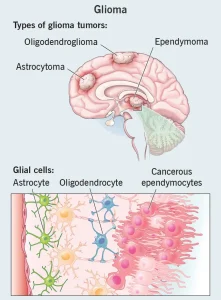Overview
Diagnosis
Diagnosing glioma involves a combination of neurological exams, imaging, and tissue testing. Healthcare professionals may use:
-
Neurological exam: Tests vision, hearing, balance, coordination, strength, and reflexes to identify potential brain tumor effects.
-
Imaging tests: MRI is the primary test for locating and sizing the glioma. CT scans and PET scans may also be used. Sometimes a contrast dye is injected to improve imaging clarity.
-
Biopsy: Tissue may be removed using a needle guided by imaging (stereotactic needle biopsy) or during surgery to confirm the presence of glioma cells.
-
Lab testing: Pathologists examine tumor tissue to determine glioma type, growth rate, and DNA changes. These results guide diagnosis and treatment planning.
Treatment
Glioma treatment depends on the tumor type, size, location, and patient health. Options include surgery, radiation, chemotherapy, and targeted therapies.
Surgery
-
Often the first step, aiming to remove the glioma completely.
-
Subtotal resection may be performed if the tumor is in a sensitive brain area or cannot be fully separated from healthy tissue.
-
Surgery can reduce symptoms even if all tumor cells cannot be removed.
-
Risks include infection, bleeding, and potential loss of function depending on tumor location.
Radiation therapy
-
Uses high-energy beams (X-rays, protons) to kill tumor cells.
-
Typically applied after surgery to target remaining cells, sometimes combined with chemotherapy.
-
May be the primary treatment if surgery is not possible.
-
Side effects can include fatigue, scalp irritation, and hair loss.
Chemotherapy
-
Uses drugs to kill tumor cells, often given orally or intravenously.
-
Sometimes applied directly to tumor cells during surgery.
-
Usually combined with radiation therapy.
-
Side effects may include nausea, vomiting, hair loss, fever, and fatigue, often manageable with medication.
Tumor treating fields therapy (TTF)
-
Electrical fields disrupt tumor cell division, used primarily for glioblastoma.
-
Pads are placed on the scalp, connected to a portable device.
-
Side effects may include skin irritation at pad sites.
Targeted therapy
-
Attacks specific chemicals within cancer cells to promote cell death.
-
Suitable for certain glioma types when other treatments are insufficient.
-
Side effects depend on the medicine and dose.
Symptom management
-
Medications may be prescribed to control seizures, reduce brain swelling, improve alertness, or support memory and cognition.
Rehabilitation after treatment
-
Physical therapy: Restores motor skills and strength.
-
Occupational therapy: Helps return to daily activities and work.
-
Speech therapy: Supports communication difficulties.
-
School support for children: Helps manage memory and cognitive changes post-treatment.
This comprehensive approach helps manage glioma while supporting recovery, quality of life, and functional independence.
Advertisement

